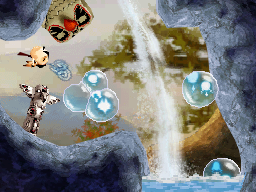 One thing that the video games industry lacks is concentrated development combined with healthy publicity. For a counter-example, look at Portal; The development of that game was done by a small team of developers at Valve that were recruited directly from game design school because of a very solid student project. They released it alongside Team Fortress 2 and Half-Life 2 episode 2 only to realize that they had an instant hit on their hands. The tight development of this small, short, but innovative, colorful game produced an award-winning bestseller when exposed to a mass market. Imagine what would have happened had that team just gone indie, made Portal, and released it for the Xbox 360 and PS3. They would be in almost exactly the same position that Mekensleep is in, with their first title Soul Bubbles. The tight development of this small, short, but innovative, colorful, and award-nominated game has produced a very limited run, and likely because it didn't get enough mass market exposure.
One thing that the video games industry lacks is concentrated development combined with healthy publicity. For a counter-example, look at Portal; The development of that game was done by a small team of developers at Valve that were recruited directly from game design school because of a very solid student project. They released it alongside Team Fortress 2 and Half-Life 2 episode 2 only to realize that they had an instant hit on their hands. The tight development of this small, short, but innovative, colorful game produced an award-winning bestseller when exposed to a mass market. Imagine what would have happened had that team just gone indie, made Portal, and released it for the Xbox 360 and PS3. They would be in almost exactly the same position that Mekensleep is in, with their first title Soul Bubbles. The tight development of this small, short, but innovative, colorful, and award-nominated game has produced a very limited run, and likely because it didn't get enough mass market exposure.This vastly underexposed DS game is a perfect counter-example to the AAA first-person fireworks and NRA-loving franchises, in that it is a tranquil, colorful, fun, and rewarding puzzle game with entirely original gameplay. The story is somewhat negligible, but the simplicity of it matches the simplicity of the game mechanics perfectly. You control a young shaman apprentice, tasked with escorting souls to the afterlife. You do so by encasing them in bubbles that you draw with the stylus and then blow them around using your lungs. You also have different masks that allow you to cut and combine bubbles, and shrink them. In addition, you can draw more bubbles to move around gasses and water to get past obstacles that your souls would either get stuck in or die to. There are eight different worlds that are themed around various shamanic traditions, each with its own unique look, feel, and gameplay tweaks, and is perfectly paced so that you have a small adjustment period to new mechanics before applying them in subsequent levels.
Soul Bubbles was released in 2008 through Eidos Interactive and sold exclusively at Toys 'R' Us--A publishing decision that could only be matched by Napoleon's invasion of Russia. Okay, so Mekensleep is a small team with limited resources and options, so I sympathize. More than anything, I'm disappointed at the total lack of publicity that this game received. Had it gotten more exposure, it could have taken off. The game itself hardly disappoints at all, and I would rate it an incredible if it incorporated a little more story into the gameplay. As is, Soul Bubbles is very memorable, so if you have a few spare dollars knocking around, try to find a copy of this sleeper hit.
Memorable